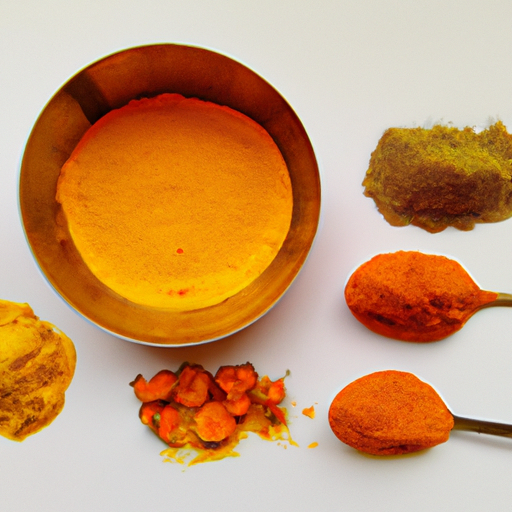As someone who loves food and enjoys cooking, it’s essential for me to have a diverse selection of spices in my pantry at all times. Turmeric, known for its bright yellow hue and distinctive taste, is a fundamental ingredient in many of my dishes. Nevertheless, just like any spice, turmeric does have an expiration date, so it’s crucial to know how to determine if it has spoiled.
Turmeric’s health benefits are well-documented, from its anti-inflammatory properties to its ability to boost brain function. But even the most nutrient-packed spice can lose its potency over time, and consuming expired turmeric can even be harmful.
In this article, I’ll provide tips on how to determine if your turmeric has gone bad, how to properly store it, and how to extend its shelf life. So, let’s get started!
Key Takeaways
- Changes in color, smell, and mold growth indicate spoiled turmeric.
- Mold growth can cause health issues due to mycotoxins.
- Proper storage is crucial to maintain freshness and prevent mold growth.
- Expired turmeric can be harmful, so regular use and monitoring for spoilage is important.
Understanding the Shelf Life of Turmeric
So, if you’re wondering how long your turmeric will last, you should know that it typically stays fresh for about a year or so. However, like most spices, the shelf life of turmeric largely depends on the way it’s stored.
Turmeric preservation is crucial in ensuring that the spice stays fresh for as long as possible. Factors affecting shelf life include exposure to moisture, light, and heat. It’s therefore essential to store turmeric in a cool, dry, and dark place, away from direct sunlight and any sources of heat.
In addition to proper storage, the quality of turmeric and the packaging also influence its shelf life. Fresh, high-quality turmeric will last longer than low-quality, stale turmeric. Similarly, turmeric stored in airtight containers will stay fresh for longer than turmeric stored in open containers.
By taking these factors into consideration, you can extend the shelf life of your turmeric and ensure that it remains fresh for as long as possible. Now, let’s take a look at some signs that your turmeric has gone bad.
Signs that Your Turmeric Has Gone Bad
When it comes to turmeric, it’s essential to know when it has gone bad. As someone who uses turmeric in my cooking, I always look out for signs that it has spoiled.
The three main indicators are changes in color, changes in smell, and the presence of mold.
Changes in Color
Turmeric that has gone bad may display a significant change in color, with up to 60% of the original color being lost. This can be a clear indication that the quality of the turmeric has deteriorated and it is no longer fit for consumption. Turmeric is known for its bright yellow color, which comes from a compound called curcumin. If the turmeric has been exposed to light and air, the curcumin can break down, causing the color to fade. In general, fresh turmeric should have a bright, vibrant color, while old or stale turmeric may appear dull or faded.
To give you a better idea of what to look for, here is a table that compares the color of fresh turmeric to turmeric that has gone bad:
| Fresh Turmeric | Turmeric that has gone bad |
|---|---|
| Bright yellow | Dull or faded |
| Vibrant | Discolored or blotchy |
| Consistent color | Uneven or mottled |
| No signs of discoloration | Brown or grayish tint |
While changes in color can be a clear sign that your turmeric has gone bad, it is not the only indicator. The smell of turmeric can also change when it has gone bad, and we will explore that in the next section.
Changes in Smell
You’ll be hit with an unpleasant odor that will make your nose scrunch up if your turmeric has spoiled. The smell test is one of the easiest ways to determine if your turmeric has gone bad.
The aroma of fresh turmeric is earthy and slightly pungent. However, when turmeric spoils, the smell can range from musty to downright putrid. To help you detect spoilage through changes in smell, here are some things to keep in mind:
- Spoiled turmeric has a strong sour odor that is impossible to ignore.
- If your turmeric smells like ammonia, it is a clear sign that it has gone bad.
If you detect any of these smells, it’s best to discard the turmeric immediately. A moldy smell is another indication that your turmeric has gone bad.
In the next section, we’ll discuss how to detect the presence of mold in your turmeric.
Presence of Mold
If you’ve ever left a vegetable in the back of your fridge for too long, you know the telltale signs of mold – and unfortunately, turmeric is no exception. When turmeric goes bad, it can develop mold on the surface or in the container. This is usually a result of improper storage or exposure to moisture.
Mold prevention is crucial when it comes to turmeric as it can pose health risks if consumed. Mold growth on turmeric can occur due to a variety of reasons, such as exposure to moisture, improper storage, or contamination. Mold can produce mycotoxins that can cause allergic reactions, respiratory problems, and other health issues.
Therefore, it’s essential to keep your turmeric dry and store it in an airtight container in a cool, dry place. Proper storage of turmeric will not only prevent mold growth, but it will also help preserve its flavor and aroma.
Proper Storage of Turmeric
Storing turmeric correctly is crucial in maintaining its freshness and flavor. Turmeric is a versatile spice that has been used for centuries due to its numerous health benefits and culinary uses. However, improper storage can cause it to lose its potency and flavor, leading to a less enjoyable culinary experience.
To make sure that your turmeric stays fresh, it is important to keep it away from heat, moisture, and light. Ideally, turmeric should be stored in an airtight container in a cool, dry place, such as a pantry or cupboard. Additionally, it is important to avoid storing turmeric near strong-smelling spices, as it can absorb their aroma and affect its own flavor.
| Emotion | Reason |
|---|---|
| Frustration | Finding out your turmeric has gone bad after cooking a dish |
| Relief | Knowing how to properly store turmeric to maintain its freshness |
| Excitement | Discovering new recipes that incorporate turmeric |
| Satisfaction | Successfully using fresh turmeric in a recipe |
By following these storage guidelines, you can prolong the shelf life of your turmeric and ensure that it remains fresh and flavorful for longer. In the next section, we will discuss some tips that can help further extend the shelf life of your turmeric.
Tips to Extend the Shelf Life of Turmeric
To keep your turmeric fresh and flavorful for longer, imagine the joy of adding a pinch of vibrant, aromatic spice to your favorite dishes by following these simple tips:
-
Store in an airtight container: The key to extending the shelf life of turmeric is to keep it away from air, moisture, and light. Store your turmeric in an airtight container, away from direct sunlight or any source of heat.
-
Keep away from moisture: Moisture is the enemy of spice. Make sure to keep your turmeric dry and away from any moisture. You can add a few grains of rice to the container to absorb any excess moisture.
-
Store in a cool and dark place: Turmeric is sensitive to light and heat. To preserve its flavor and color, store it in a cool and dark place, such as a pantry or a cupboard.
-
Use it regularly: The best way to ensure that your turmeric stays fresh is to use it regularly. Incorporate turmeric into your daily cooking, such as adding it to your curries, soups, smoothies, or marinades. Not only will it add flavor and color to your dishes, but it also has numerous health benefits, such as reducing inflammation and boosting immunity.
By following these simple tips, you can ensure that your turmeric stays fresh and flavorful for longer. Ways to incorporate turmeric into your diet are endless, so get creative and experiment with different dishes. Keep in mind the health benefits of consuming turmeric regularly, and make it a staple in your kitchen.
Frequently Asked Questions
Can you still use turmeric past its expiration date?
Using expired turmeric can be risky as it may lose its potency and flavor. However, it can still be safe to consume depending on how long it has been expired. Alternatively, expired turmeric can be used as a natural dye or in skincare products.
Can you freeze turmeric to extend its shelf life?
I’ve found that freezing turmeric can indeed extend its shelf life. By storing it in an airtight container, you can preserve the color and flavor for up to a year. This method is especially helpful if you use turmeric infrequently.
Is it safe to consume moldy turmeric?
Consuming moldy turmeric poses health risks and should be avoided. Dispose of it safely to prevent any spread of mold. Check for mold growth regularly to prevent ingestion of contaminated turmeric.
How long does ground turmeric last compared to whole turmeric?
Did you know that ground turmeric only lasts about six months compared to the two-year shelf life of whole turmeric? To make your turmeric last longer, store it in an airtight container in a cool, dry place away from sunlight.
Can exposure to sunlight or heat affect the quality of turmeric?
Yes, exposure to sunlight and heat can negatively impact the quality of turmeric, leading to a loss of freshness. To preserve turmeric, store it in a cool, dry place away from direct sunlight and heat sources.
Conclusion
So there you have it, folks. Knowing how to properly store turmeric and being aware of the signs of spoilage can help you get the most out of this versatile spice.
While it’s true that turmeric has a long shelf life, it’s important to keep it in a cool, dry place away from sunlight and moisture.
When turmeric has gone bad, you’ll know it by the loss of aroma, dull color, and bitter taste. But fear not, with these tips, you can extend the shelf life of your turmeric and enjoy its many health benefits for months to come.
So go ahead, add a dash of turmeric to your favorite dishes and reap the rewards of this ancient spice. With proper storage and a little bit of knowledge, you can enjoy the rich flavor and vibrant color of turmeric for years to come.










